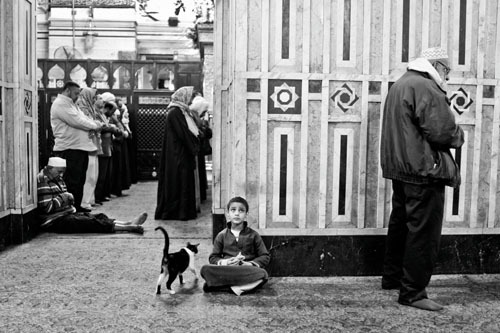[TABLE="class: caption-frame, width: 754"]
Prayers at the Saida Zainab mosque in downtown Cairo, December 2013[TR]
[TD]
[/TD]
[/TR]
[/TABLE]
This article is a preview from the Summer 2015 edition of New Humanist. You can find out more and subscribe here.
Religious disbelief is viewed with alarm in most Arab countries. Two government ministries in Egypt have been ordered to produce a national plan to “confront and eliminate” atheism. In Saudi Arabia, the most recent anti-terrorism law classifies “calling for atheist thought” as a terrorist offence.
This hounding of non-believers might seem especially strange at a time when concerns are high about those who kill in the name of religion, but Arab societies have a general aversion to nonconformity, and the regimes that rule them often promote an official version of Islam that suits their political needs. Thus both jihadism and atheism – though very different in character – are viewed as forms of social or political deviance, with fears raised in the Arab media that those who reject God and religion will bring chaos and immorality if their ideas gain a foothold.
In six Arab countries – Kuwait, Qatar, Saudi Arabia, Sudan, the United Arab Emirates and Yemen – apostasy is punishable by death. There have been no executions in recent years, but people deemed to have “insulted” religion, often in trivial ways, can face long prison sentences.
In Egypt, where the military chief Abdel Fattah el-Sisi seized power in 2013, ousting an Islamist president, the new regime has been simultaneously cracking down on the Muslim Brotherhood, suspected religious extremists and atheists. Among other things, a café in Cairo which was allegedly frequented by atheists has been shut down and a college librarian who talked about humanism in a TV programme is facing dismissal from his job and may go on trial for “promoting atheistic ideas”.
Arab atheists are becoming more visible, largely due to social media. There is also a perception that their numbers are growing. In 2012 a poll by WIN/Gallup International that looked at religion in 57 countries caused particular alarm in Saudi Arabia, which, as the birthplace of Islam, claims to be the holiest of the Arab countries. Of those interviewed there, 19 per cent said they were not religious and 5 per cent described themselves as convinced atheists.
In Egypt, the emergence of an atheist “menace” fits the government’s political narrative. It is presented as an unfortunate result of 12 months’ misrule by the Muslim Brotherhood. In a similar vein, some analysts have suggested that ISIS, while attracting some Muslims to fight, is driving others away from Islam. There is very little evidence to support such theories. Atheists, after all, disagree with religion in general, not simply with the more outlandish forms of it. The problematic aspects of Islam, as expressed by those who leave the faith, tend to be rather different from those highlighted in western media.
Last year, researching my book
Arabs Without God, I tried to find out why some Arabs turn to atheism. No one I spoke to mentioned terrorism as a major factor. Those who abandoned Islam did so because they rejected basic tenets of the faith, mainly as taught to them in schools and by government-approved clerics. In interviews, they mostly described a gradual progression away from religion, sometimes spread over years; there was no sudden “road to Damascus” moment of conversion to atheism. Typically, it began with a niggling question about some aspect of religious teaching that struck them as illogical, and often they had hoped to resolve these discrepancies to have a better understanding of their faith.
The issue most often cited by Arabs as their first step on the road to disbelief was the apparent unfairness of divine justice. The picture they had acquired was of an irascible and sometimes irrational deity who behaves in much the same way as an Arab dictator or an old-fashioned family patriarch – an anthropomorphic figure who makes arbitrary decisions and seems eager to punish people at the slightest opportunity. Dire warnings, constantly repeated in the Qur’an, of what would happen to non-believers had clearly made a strong impression on them in childhood.
“The idea of eternal hell was very disturbing to me,” said Mohammed Ramadan, an Egyptian. “I was nine when I asked my parents why would God punish us for ever when we live for an average of ************SPAM/BANNEAR************ 70 years.”
A Saudi who is known on Twitter as “Arab Atheist” was troubled by the question of why seemingly decent non-Muslims should be punished by God. Arriving in the US to study at a Jesuit college, he began to realise “how similar all religions are” in their basic teachings. “In Islam,” he said, “we are taught that all non-Muslims are going to hell. I had Jewish neighbours who were the kindest and sweetest couple and it made me wonder, why should they go to hell? And suddenly Islam started to crumble in my eyes.”
Waleed al-Husseini, from the Palestinian town of Qalqilya, grew up in what he describes as a normal Muslim family but in secondary school he started asking “questions like whether we are free to choose or not”. Without realising it at the time, he had stumbled into a debate about free will and predestination that has exercised the minds of theologians – Christian as well as Muslim – for centuries. Husseini put his questions to a teacher at school. “The teacher said it’s haram [forbidden] to ask about that,” he recalled. “I didn’t have an answer so I went to an imam in Qalqilya and I got the same reply.”
This kind of response is familiar in authoritarian societies and is described by many other Arabs who have abandoned religion. By prompting them to look further afield for answers, it has probably set many young Muslims on the road to disbelief. With his curiosity aroused, Husseini embarked on his own research. “I went to the library in my school and the public library in my city. You can find many things there about religion but not about criticisms of religion,” he said. “I spent around four years searching because when I started with this issue I discovered more and more. Step by step I moved away from religion until I left Islam in my first year at university.”
Given the way Islam is often invoked to justify gender inequality – the discriminatory inheritance rules, for example, and subordination under the guise of female “modesty” – it might be argued that women in the Middle East have more reasons than men for abandoning religion. Some certainly do rebel and leave, but social conditions created by the patriarchal system make it difficult for others even to contemplate doing so. For vast numbers of Arab women, choosing between belief and non-belief is not a realistic option. Nabila from Bahrain explained: “There is a lot of pressure on women to conform. For instance, something as simple as finding a partner or getting into a relationship. Everything is counted, everything is watched.”
The popular association of atheism with immorality is a particular deterrent for women who have religious doubts, since in Arab society they are expected to be “virtuous” in order to marry. “It is difficult to come out as an atheist because society immediately considers you to be a person without moral values or ethics. This affects girls the most,” the administrator of the “Arab Atheists” Facebook page noted. “We have had to remove names of female members from the page to protect them from families and society.”
Social pressures of this kind are obviously not the ************SPAM/BANNEAR************ reason why many women still cling to religion. For those who feel oppressed it can also provide a “comfort factor”, creating a paradoxical situation in which women may be simultaneously subjugated and sustained by their faith.
One striking difference between Arab non-believers and those in the West is that scientific arguments about evolution and the origins of the universe, a major part of Western atheist discourse, play ************SPAM/BANNEAR************ a minor role in Arabs’ drift away from religion – at least in the earlier stages. Generally, their initial questioning is not so much about the possibility (or otherwise) of God’s existence as about whether God could exist in the form described by organised religions.
A few, while rejecting the God of Islam, maintain a vague belief in a deity or express a yearning for “spirituality”. In different circumstances, some might have explored other belief systems or “New Age” religion but the opportunities are severely restricted in the Middle East. Most Muslim countries tolerate Christianity and Judaism up to a point, referring to them as the “heavenly” religions, but others are not usually recognised or allowed – though they may be practised surreptitiously. In Kuwait, there are yoga classes and “healing centres” run by Buddhists but they don’t advertise their religious connections.
Some Muslims also make a tactical decision not to break with religion completely, presenting themselves as secularists, “progressive” Muslims or Muslim “reformers”. They feel that more can be achieved by challenging oppressive religious practices than by questioning the existence of God, since they are unlikely to be listened to if they are known to be atheists. Of course, not all progressive Muslims are secret non-believers – many are genuinely religious – but Ghassan Abdullah of Birzeit University, who has studied the work of a score of 20th-century “secular” Arab thinkers, believes that “a high proportion” of them were in fact atheists, or at least “did not subscribe to the idea of a God in the sky”. Several of them had said so privately, he added. “Writing critically about religion in the Arab world is not easy or safe,” Abdullah explained, but “as readers of rationalists in Arabic, we develop a sense of what such writers mean when they use certain ways of expressing their thoughts, and can guess their positions that they cannot declare openly.”
The Deen Research Center, which describes itself as a “modern Islamic thinktank”, is one example of an organisation that radically reinterprets scripture and steers very close to atheism while still claiming membership of the Muslim faith. “We believe the Qur’an rejects all forms of superstition, blind worship, discrimination, oppression, aggression, autocracy, theocracy, oppressive tradition and anti-scientism,” it says on its website. The website also stops just short of outright atheism by redefining God: “We do not believe in a god as seen by the mainstream within the religions. We believe in a god, or rather a force that is beyond comprehension, has no form or position, nor has any personal gains in the results of the universe but also does not play with humans as a despotic king or a dictator. We do not believe in ideas of salvational worship or the supernatural.”
While there’s little doubt that an Islamic reformation would benefit the Middle East socially and politically, atheists cannot advocate this without sacrificing their principles. Progressive versions of Islam generally view the Qur’an in its historical context, arguing that rules which applied in the time of the Prophet can be reinterpreted today in the light of changing circumstances – but that involves accepting the Qur’an as the supreme scriptural authority.
The status of the Qur’an is a particularly important issue for both followers and opponents of Islam. Whereas Christians usually consider the Bible as divinely inspired but written by humans, the Qur’an is claimed to be the actual words of God, as revealed to the Prophet Muhammad by the Angel Gabriel (Jibril in Arabic).
For atheists from a Muslim background, disputing the authenticity of the Qur’an and the Prophet often seems more relevant than questioning God – and there is a long tradition of doing so. Two notable figures of the ninth and tenth centuries, Ibn al-Rawandi and Abu Bakr al-Razi (both Persian), have often been labelled as atheists, though it would be more accurate to describe them as anti-prophetic rationalists. They were not concerned with whether God exists (and had little scientific knowledge on which to build a case) but they were very sceptical about prophets, including Muhammad. With various people claiming to be prophets and often contradicting each other, logic suggested they couldn’t all have a hotline to God. So the question was which of them – if any – were genuine.
Then, as now, the arguments of non-believers tended to rely on irrationality in religious doctrine rather than questioning the evidence for God’s existence. This is where atheist reactions to Islam and to Christianity diverge.
Although there is a long history of conflicts between science and Christianity, Muslims have not generally regarded scientific discoveries as a threat. The famous occasion in 1633 when Italian scientist Galileo Galilei was forced by the Roman Catholic Church to recant his “heretical” belief that the earth revolves around the sun has no Islamic equivalent. Muslims’ historical eagerness to engage with science was connected to their faith. Astronomy was of particular interest since they used a lunar calendar, and needed to ascertain the direction of Mecca when praying.
Publication of Charles Darwin’s book
On the Origin of Species in 1859 drew a mixed response from Muslims. Some, including the Grand Mufti of Egypt, relished the problems that Darwin’s theory caused for Christianity, arguing that Islam was relatively free from conflicts over science and thus more capable of taking things in its stride. Today, Muslim opposition to Darwinism is growing, probably due to the trend towards religious conservatism and literal interpretations of scripture since the 1970s. As a result, evolution is an area where Arab schools, universities and media tread warily for fear of provoking complaints.
In the Middle East the God question is far more than a matter for intellectual debate. Because politics and religion are so closely entwined, challenging religion can mean challenging the politics too. Most Arab regimes use religious credentials to compensate for their lack of electoral legitimacy, adopting and promoting whatever version of Islam assists their self-preservation.
The Ba’athist regime in Syria, for example – despite having secular leanings – invented its own monolithic brand of Islam which basically denied the existence of sectarian differences and didn’t allow people to talk about them openly. This helped to disguise the fact that members of the minority Alawite sect held dominant positions within the regime – in a country with a large Sunni majority. In the most extreme case, Saudi Arabia, it is impossible to be openly atheist without opposing the political system too. The kingdom’s Basic Law (the equivalent of a constitution) states that “government in Saudi Arabia derives power from the Holy Qur’an and the Prophet’s tradition” and adds that Saudi society is “based on the principle of adherence to God’s command”.
At present, Arabs who reject religion are too small in numbers to pose an actual threat to these regimes but the regimes would like to keep it that way. Their fears, absurd as it might seem to outsiders, are not without foundation.








